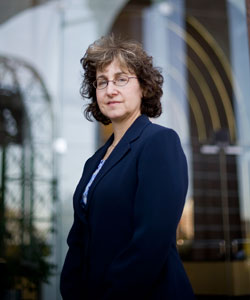The Art of Speechwriting: Pointers from a Pro

And not just any pro. Lauren Weiner '81 drafts speeches for the top man at the Pentagon. Weiner says that every speech is a team effort involving a "long and excruciating" fact-checking process and editing by everyone ("brutal, but strangely I like it"). She and her colleagues absorb Secretary of Defense Robert Gates's style by listening to him in meetings and interviews and by poring over his 1996 memoir, From the Shadows. Cool fact: Weiner wrote the video script for President Obama's 2009 Super Bowl Sunday message to the troops overseas. "It was brief, not even two hundred words, but it was something to tell my dad about." Here, a few speechwriting tips.
Within the constraints of the occasion, try to give the speech a little oomph. It takes ingenuity to liven up remarks consisting largely of prescribed elements. Try to find something distinctive. Example: Secretary Gates was to speak to a group of foreign military officers, and it struck me that the event would be held at Fort McNair, across the river from Arlington National Cemetery. I decided to see if any non-Americans were buried at Arlington. This proved to be the case, and I was able to enhance the usual thank-you to allies with a tribute to their soldiers' sacrifices.
Don't confuse yourself with a writer for Comedy Central. It's hard to be out-and-out funny. Aiming for something mildly clever is more realistic. And anyway, a secretary of defense being mildly clever will draw laughs from an audience—many more than if you or I said the same thing. On the night that Secretary Gates gave the inaugural Dean Acheson Lecture in Washington, voters around the country were tuning in to a McCain-Obama debate. Playing off this, I had him use Acheson's anecdote about a man from Kentucky who, when asked which sheriff candidate he backed, said, "I haven't made up my mind yet; but when I do, I'll be bitter as hell." There was laughter. Then Gates ad-libbed: "That probably should take care of being asked to stay on in any successive administration." This brought down the house (and was ironic in light of his later being asked to stay on).
Criticism will be magnified, so file the edges off. Gates often urges the members of Congress to heed the Defense Department's budgetary decisions instead of following their political instincts, which tell them to push hard for spending on bases in their districts or weapons systems built there. Rather than denounce them as vote-grubbing porkers, he'll allude to "the built-in domestic constituency for defense programs."
Less is more. That is, except when more is less. Work for concision. When going over a text, I will discover sooner or later that "ordinance removal and destruction activities" should be "bomb squad." The exception to the rule is acronyms, that well-known Defense Department specialty. I take pride in my bias against Pentagon-speak. The terms favored by officials—particularly the specialists who sometimes have input on a draft—are a comprehension-killer, not to mention that they make the speaker sound clubby and insular. Translating "MNSTC-I" into "our commanders in Iraq" raises the word count, but so be it.
Rummage around. You never know where an illustrative tidbit might be hiding. Paging through my ragged copy of the Norton Anthology from Kenyon days, I found the phrase "pimps of France"—a Federalist jab at the Jeffersonians, who were backing the French Revolution—and thought it could go in Gates's speech about the perennial, often vehement debate over global engagement. A bit on the cheeky side but our chief speechwriter threw it right in.
Pay attention to nuance. There are a hundred ways to say anything. The expression that gives you that "Eureka!" feeling is the one that achieves more than a single purpose. Drafting a dedication of the Pentagon's 9/11 memorial, I wanted to stress how daily life had resumed around the spot where American Airlines Flight 77 had hit. Referring to air traffic around the Pentagon, the text had "airplanes." In later drafts: "planes." Then I realized that what Secretary Gates needed to say was: "Passenger jets fly by; and they fly close." The restored-normalcy aspect was there, but we also had a mental picture of human beings in midair. It added an overtone appropriate to the occasion.
Take additions in stride. The New York Times ran a front-page photo of a soldier in Afghanistan who had rushed to his battle station in his pink boxer shorts and commenced firing at the enemy. I was being lobbied by our researchers to have Gates mention the photo in the speech I was working on. Finally I stuck in a mention, only to find that in the next round of edits, Gates had expanded the anecdote, making it into a joke about this being a new form of psychological warfare against the Taliban. The press picked up on it. Actually, in the vast majority of cases where the media quote from a Gates speech, it is something he either added or reshaped.
Take subtractions in stride. Months after the fact, we learned from a young colleague that his friends at a military service academy had been wowed by Gates's commencement address. We had thought of that speech as a disappointment—Gates had deleted from it material we especially liked. Time to stop gnashing our teeth and remember that the event gave pleasure to a group of cadets, every single one of whom chose that path knowing he or she might be headed for a combat theater. Could there be a nicer reward for somebody in the speechwriting racket?

 Delicious
Delicious Facebook
Facebook StumbleUpon
StumbleUpon Digg
Digg reddit
reddit